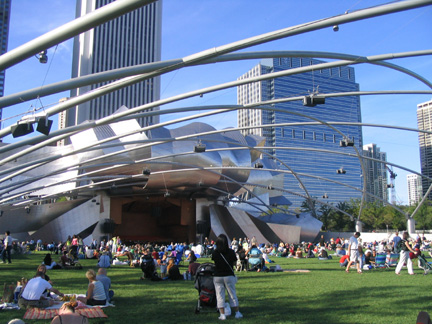|
|
 Classical music in America, like pretty much everything else, is increasingly about marketing. Very fine ensembles, often in the suburbs, market proximity, price and informality as much as music they play. It's just too much of a hassle to trek down to the Loop to attend Chicago Symphony concerts, they assure us. The suburban counterparts are "good enough," and a lot more convenient. This, of course, is like a Roman saying they've never visited the Sistine Chapel because the parking is better at the local parrish Classical music in America, like pretty much everything else, is increasingly about marketing. Very fine ensembles, often in the suburbs, market proximity, price and informality as much as music they play. It's just too much of a hassle to trek down to the Loop to attend Chicago Symphony concerts, they assure us. The suburban counterparts are "good enough," and a lot more convenient. This, of course, is like a Roman saying they've never visited the Sistine Chapel because the parking is better at the local parrish
The essential difference was never more clear than last night, when the Chicago Symphony Orchestra, under the baton of music director Daniel Barenboim, played a concert of Mozart and Ravel at the Frank Gehry-designed Pritzker Pavilion in Millennium Park. A previous commitment kept me away from much of the program. I arrived just as the strains of Ravel's Pavane for a Dead Princess began to waft through the evening air. The threat of rain having diminished attendence, the large lawn was sparsely filled, allowing me to check out the sound from the farther reaches of the great trellis. Unlike the old sound system at the Petrillo bandshell, which had all the subtlety of a squawk box at a McDonald's drive-through, that at Pritzker, designed by The Talaske Group, creates a distinct acoustical space, an extended room in which the Pavane's gentle horns resonated with a palpable sense of warmth.
It is no slight to the Grant Park Symphony, Music Director Carlos Kalmar's quite wonderful orchestra that's the bedrock of the Pritzker's summer season, to note that the CSO boosted the music-making to another level, that of a virtuoso band unsurpassed anywhere in the world, not only in terms of raw power - this is Chicago, after all - but in the ability to impart a profound expressiveness to even the most extreme tempo or dynamic.
This was richly on display in the closing work on the program, Ravel's Bolero, which the composer himself was said to have called fourteen minutes of orchestration without music. It's not the world's most profound music and, despite associations with a nubile Bo Derek jogging across a beach, it offers less a lush Daphnis et Chloe-like sensuality than an act of passion synchronized with the workings of a Swiss watch. In the wrong hands, it's insufferable. In the hands of the CSO, it was a dazzling play of rhythm and orchestral color. Barenboim was content to barely conduct at all, but to stand back, with an occasional small gesture to nudge things along, and simply listen as his players took command. From the quiet beginnings with a snare drum, the relentlessly recurring theme moved in a slow, continuous crescendo from section to section, to the strings, to the woodwinds, each having their own solo turn to shine, before climaxing in blaring brass and full tutti that collapses into a brief, precipitous coda like a lover after climax. The audience leapt to their feet in one of those rare, unforced standing ovations that comes from the giddy delight only great music-making can provide.
We live in the rabid stages of a market economy that seeks to bring every activity to its cheapest, most "efficient", lowest common denominator, whether it be Walmart driving out all local competition and the variety it provided, or Federated destroying the department store as a local institution as it rushes to smear every last one with the Macy's name. To hear the CSO firing on all cylinders is a bracing reminder just what this chronic leveling robs us of.
Comment on this story
lynnbecker@lynnbecker.com
© Copyright
2005 Lynn Becker All rights
reserved.
|

